

Modal Verbs.
Verbs + 'infinitive' or 'gerund' English Language Grammar: How to Use Gerunds and Infinitives. Verb patterns - 6 Minute Grammar. BBC Learning English - Course: lower intermediate / Unit 10 / Session 2 / Activity 1. The gerund and the "to" infinitive. Gerunds vs. Infinitives, Part 1. AA: I'm Avi Arditti with Rosanne Skirble, and this week on Wordmaster: to be or not to be, or should there be an -ing?
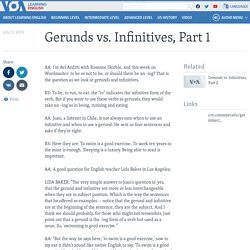
That is the question as we look at gerunds and infinitives. RS: To be, to run, to eat: the "to" indicates the infinitive form of the verb. But if you were to use these verbs as gerunds, they would take an –ing as in being, running and eating. Gerunds vs. Infinitives, Part 2. AA: I'm Avi Arditti with Rosanne Skirble, and this week on Wordmaster: more of our discussion of gerunds and infinitives with English teacher Lida Baker.
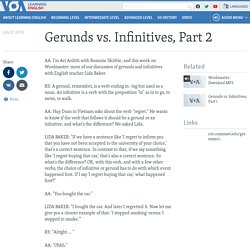
RS: A gerund, remember, is a verb ending in -ing but used as a noun. An infinitive is a verb with the preposition "to" as in to go, to swim, to walk. AA: Huy Doan in Vietnam asks about the verb "regret. " Everyday Grammar: Gerunds and Infinitives. Accessibility links Languages VOA Learning English.

Verbs and Infinitives in Everyday Speech. The 1977 movie Star Wars is an American classic, with many memorable lines and characters. At one point in the film, the character C-3PO says the following words: "We seem to be made to suffer. It's our lot in life. " Today, we are going to explore that statement. We are not talking about the meaning behind the statement. What Are You Excited About Learning? Hi everyone!

Today, let’s start the program with a question: What is your city famous for making? I’ll tell you my answer. New York is famous for making great pizza. Here’s another question that follows the same structure: What are you excited about learning? Test Yourself with This Everyday Grammar Quiz. We have an expression in English that goes “Use it or lose it.”

It means that if you do not use or practice an ability, you might lose that ability. That could not be more true about English grammar. And here at Everyday Grammar, we do not always give you a chance to review the material we teach you. So today I am going to do that with a short quiz on some of the grammar rules I have talked about on the show. Gerunds and Infinitives Exercise 1. Gerund or Infinitive Quiz for English Learners. Verb + -ing or verb + infinitive. After certain verbs we use the -ing form, and after other verbs we use the infinitive.
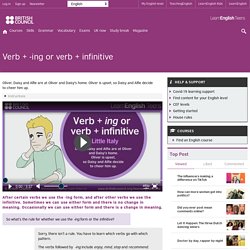
Sometimes we can use either form and there is no change in meaning. Occasionally we can use either form and there is a change in meaning. So what’s the rule for whether we use the -ing form or the infinitive? Sorry, there isn’t a rule. You have to learn which verbs go with which pattern. The verbs followed by -ing include enjoy, mind, stop and recommend. I told him you really enjoy cooking. The negative is verb + not + -ing. Grammar snack: Verb + -ing or verb + infinitive. Comparing Gerunds, Participles, and Infinitives. Summary: This handout provides a detailed overview (including descriptions and examples) of gerunds, participles, and infinitives.

Comparing Gerunds and Participles Look at the pair of sentences below. In the first, the use of a gerund (functioning as a noun) allows the meaning to be expressed more precisely than in the second. In the first sentence, the interrupting, a specific behavior, is precisely indicated as the cause of the speaker's irritation. I was irritated by Bill's constant interrupting. The same pattern is shown in these other example pairs below: in the first of each pair, a gerund (noun-function) is used; in the second, a participle (adjective-function).
Using Gerunds and Infinitives. Gerunds and infinitives are verb forms that can take the place of a noun in a sentence.
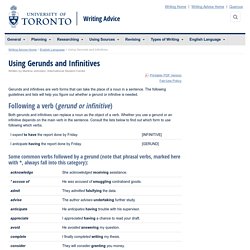
The following guidelines and lists will help you figure out whether a gerund or infinitive is needed. Following a verb (gerund or infinitive) Both gerunds and infinitives can replace a noun as the object of a verb. Whether you use a gerund or an infinitive depends on the main verb in the sentence. Consult the lists below to find out which form to use following which verbs. Some common verbs followed by a gerund (note that phrasal verbs, marked here with *, always fall into this category): Gerunds vs. Infinitives, Part 2. Getting to Know Gerunds and Infinitives. Welcome to another episode of Everyday Grammar on VOA Learning English.
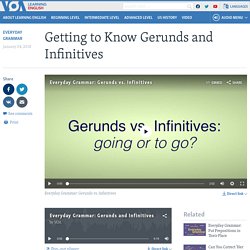
English learners have difficulty with gerunds and infinitives. A gerund is the –ing form of a verb that functions the same as a noun. For example, “Running is fun.” In this sentence, “running” is the gerund. It acts just like a noun. Everyday Grammar: Gerunds and Infinitives. Welcome to another episode of Everyday Grammar on VOA Learning English.
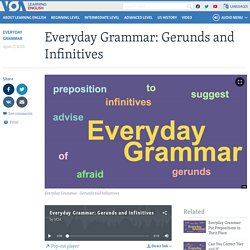
English learners have difficulty with gerunds and infinitives. A gerund is the –ing form of a verb that functions the same as a noun. For example, “Running is fun.” In this sentence, “running” is the gerund. It acts just like a noun. The infinitive form of a verb appears either as the basic form (with no marking) or with the word “to.”
Preposition 'to' + '-ing' or 'infinitive'? - Learners' Questions. Learning English. Verb patterns. Verb patterns site:bbc.co.uk at DuckDuckGo. Gerunds and Infinitives site:www.thoughtco.com at DuckDuckGo. Gerunds and Infinitives at DuckDuckGo. Gerunds and Infinitives Exercises. Gerunds and Infinitives Exercises Use the info you have learned on the Gerunds and Infinitives explanation page. When in doubt, use a dictionary! Click Here for Step-by-Step Rules, Stories and Exercises to Practice All English Tenses. Search Results for “gerund infinitive” Infinitives, gerunds and present participles - English Grammar Step by Step - Advanced English Grammar. Put the verbs in parentheses into the correct form. 1 Examples: (modal auxiliary verbs) You can hand your project in at your leisure.
He ought not to put all his eggs in one basket. It's very risky. Modal verbs are followed by a plain infinitive, apart from the following ones: be to, have to, ought to, used to and sometimes dare. A2 Grammar: Gerunds and Infinitives. English grammar infinitive. Verb patterns - adverbials. BBC Learning English - Course: English You Need / Unit 5 / Session 5 / Activity 1. Grammar: verb patterns. Indexphrases. Exercise on Infinitive / Gerund. Exercise on Infinitive / Gerund. Exercise on Infinitive / Gerund. BBC Learning English - Course: The Grammar Gameshow / Unit 1 / Session 8 / Activity 1. Content Frame. Is it grammatically impossible to use the infinitive after the word "like", when it´s equivalent to "such as"? I know that using the gerund is the traditional recommendation (and it does sound much better); however, what is not clear to me is whether it´s technically possible (even if highly unlikely) to also use the infinitive.For example:Children are better than adults at many things, like having/to have fun, acting/to act spontaneously, etc.Thanks for any comments!
Gisele ggssalum@terra.com.br Posted 05 November 2002 Yes, it's grammatically impossible to use the infinitive after the word like when like is used as a preposition as in your example sentence. A preposition is followed by a noun or an object pronoun, or by the noun form of the verb. The noun form of the verb is the gerund. The Flatmates - Quiz 30.
Retirement: verb patterns. Verb patterns. Verbs with to + infinitive. The Flatmates - Language Point 29. Use. Exercises and Tests on Infinitive and Gerund There are certain words in English that are usually followed by an infinitive or gerund. If you are not sure whether to use the infinitive or gerund, check out our lists or look the words up in a dictionary. Infinitive Use. English Test on Infinitive and Gerund. Gerund or Infinitive. Would you mind? Gerunds - ing and infinitive to. ESL Interactive Fun Games Here we have the games carefully laid out for you. Follow the links to browse the variety of games offered. This is only the directory for interactive games and exercises. Our ESL fun games here include : Snakes and Ladders, Hangman, Spelling games, Wheel of Fortune, TV Games(Betting Game), Mazes, Memory Games, Matching exercises, Sequencing exercises, Picture Quizzes, Catch it and more.
These games provide the ultimate fun in practising the following skills: Misuse of the Infinitives. Gerund or Infinitive. Gerund or Infinitive. Info page Gerunds:Infinitives. Gerunds and infinitives part 4. Gerunds and infinitives part 3. Gerunds and infinitives part 2. Gerunds and infinitives part 1. Verb patterns again – final solution. Have you ever tried to memorise the following list of verbs to know when you should use TO and when the ending ING? ADVERT: Are you able to memorise this? Honestly, I have never been able to commit the list to memory. And even when I thought that I know the verbs I was not really sure which form follows them. And my students had the same problem. So I have written a post on verb patterns. And when I started to be desperate I read a short comment under a post on verb patterns. Exercise on Gerund used as a subject. Exercise on Gerund. Why bother? Infinitives. Gerunds.
Guide to Verb Types in English. Gerund / infinitive - ESL activities. How Donald Trump got rich: a tale of three Trumps. Gerund / infinitive - ESL activities. Gerund Or Infinitive? - ProProfs Quiz. Verb, Participle, Or Gerund? - ProProfs Quiz. Gerund Vs Infinitive - ProProfs Quiz. Phrasal Verbs and Prepositional Verbs - Differences. Infinitive Or Gerunds - ProProfs Quiz.
FEGi Talking Heads. Gerunds and Infinitives 1. Yuri was in his first year at university, studying History. He was rather a lazy student, and he tended to avoid (work) whenever he could. In the middle of the semester, his history professor gave out an assignment, due in two weeks. Gerunds and Infinitives 2. Gerunds and Infinitives 3. The next four exercises include 40 of the most common verbs and phrases that followed by gerunds, infinitives or both. Gerunds and Infinitives 4. Gerunds and Infinitives 5. Gerunds and Infinitives 6. Gerunds and Infinitives Exercise 1.